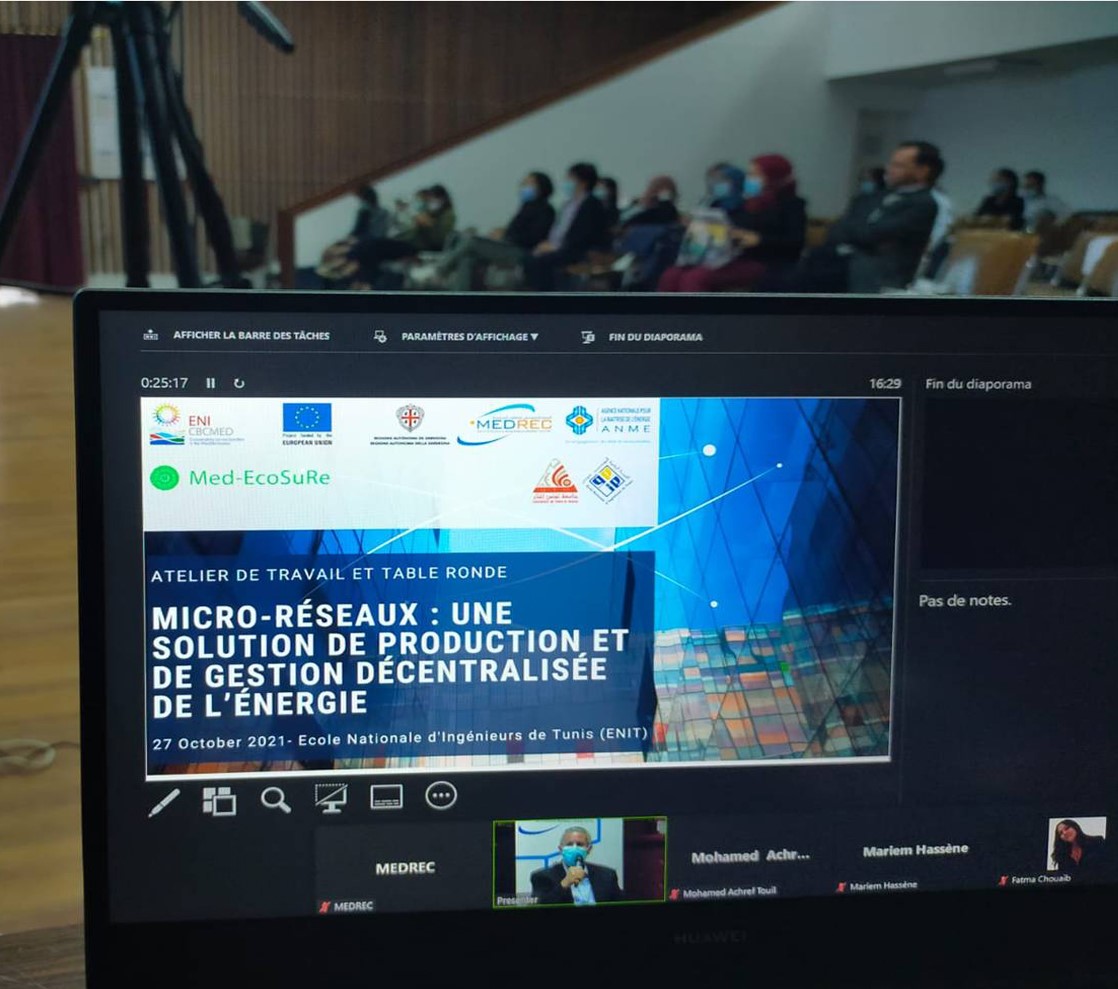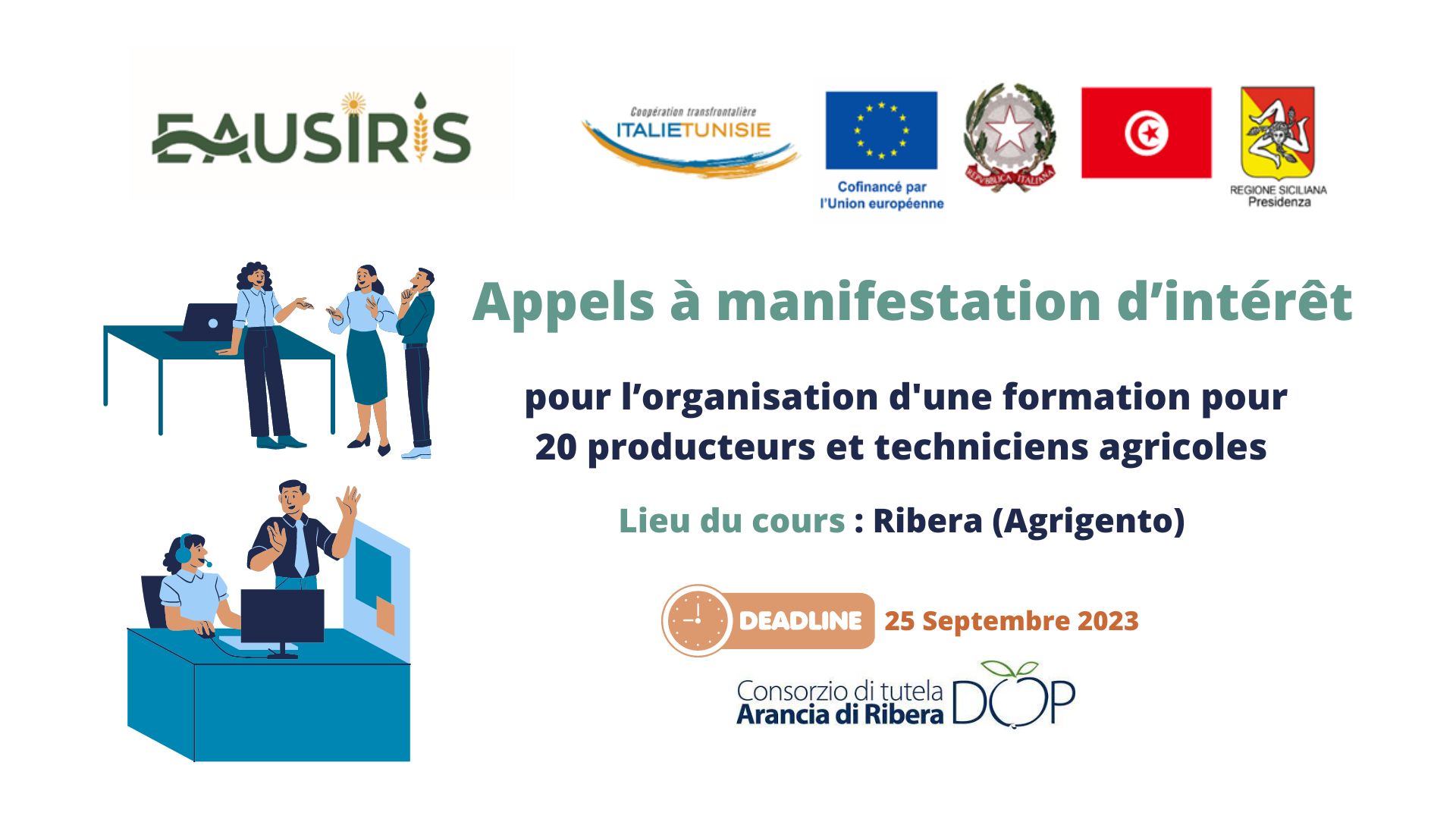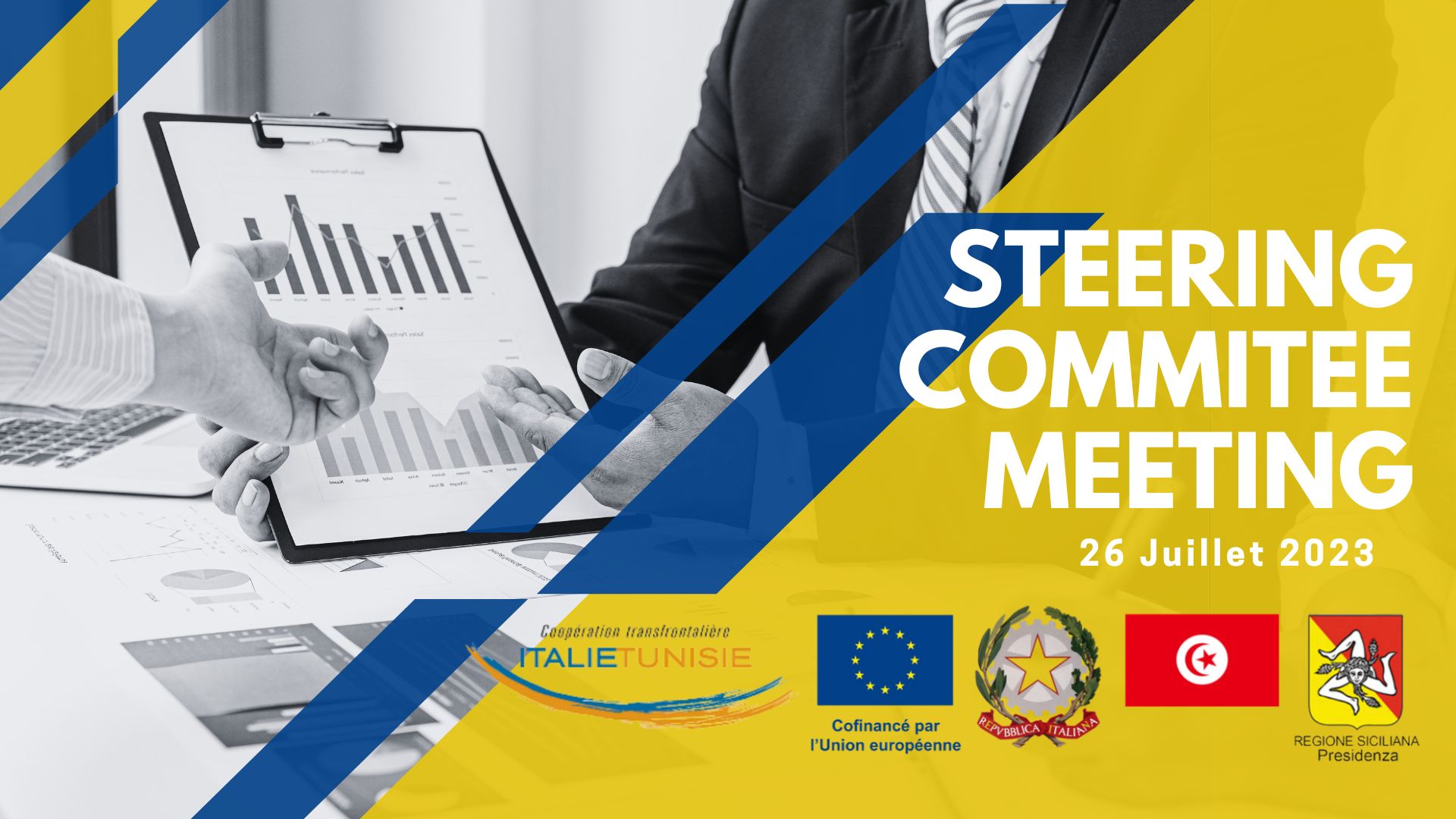
Med-EcoSuRe kicks off collaboration with Mediterranean initiatives to foster the integration of decentralized energy generation in Tunisia
October 27th , 2021, MEDREC (Mediterranean Renewable Energy Centre) and ENIT (National Engineering School of Tunis) convened decision makers, academics and private companies from the Mediterranean, as well as initiatives such as Interreg MED Renewable Energy community and SUNREF (Sustainable Use of Natural Resources and Energy Finance) for a workshop on “Micro-Grids as decentralized energy generation and management solutions."

This workshop was organized to explore the potential of scaling-up a Micro-Grid platform equipped with an Energy Management system and powered by Photovoltaic panels, implemented within Med-EcoSuRe, called SMARTNESS (Smart Micro Grid Platform with an Energy Management System) which serves as a platform for: Demonstration, Research, and Training.

The hybrid workshop program included:
- Conferences: during which best practices of the implementation of micro-grids in the Mediterranean context were shared. For instance, the PEGASUS project, funded within the Interreg MED programme, was presented, which has as objective to implement a set of tools and measures facilitating the development of microgrids. Besides, the design and technical framework for the development and implementation of micro-grid projects as forms of decentralized energy generation were presented by different organizations among which is the research and technology transfer center CITCEA, part of the Universitat Politècnica de Catalunya (UPC) specialized in power electronics and its applications.
- A round table engaging decision makers and key actors which was highly dynamic and included joint discussions on “Opportunities and challenges for the development of decentralized energy generation”, with a special focus on micro-grids, which enabled participants to explore in-depth knowledge related to technical and legal framework of decentralized energy generation. Below is a summary of the Question/Answer session of the round table:
Speaker 1. Dhouha Garrab Head of the Energy Efficiency and Network Quality Department, Technology / Research and Innovation Department at STEG (The Tunisian Company of Electricity and Gas) | |
|---|---|
Q. In order to meet the growing demand for electrical energy and to maintain the quality of electrical energy, to what extent will STEG opt for a local micro-grid scheme?
| R. Today, STEG has launched an ambitious program to integrate Renewable Energies into the national energy mix. The challenges are mainly related to decentralized energy generation from intermittent renewable sources and to the new automotive market which is growing in Tunisia, leading to greater demand. We are interested in two types of micro-grid: The first is mainly the “smart-grid” which is only a kind of modernization of the national grid through pilot projects including the installation of smart meters like the one of Sfax, and the second type is a classic micro-grid which will be tested in Karkenah, to reduce the region's vulnerability to the reliability of the electricity supply. |
Speaker 2. Cléo Fulchiron Coordinator of the programme SUNREF-Tunisia | |
Q. What financing schemes does the SUNREF program offer to the private sector to help promote decentralized energy generation and self-consumption projects in Tunisia?
| R. In addition to standard solar installation projects, the SUNREF program provides funds for feasibility studies for innovative projects led by SMEs (Small and medium-sized enterprises), while always taking into account the legislative framework which is sometimes restrictive. We can mention the example of an entrepreneur in the agricultural sector wishing to install a PV (Photovoltaic) plant that supplies several sites and types of electricity consumption, including farm buildings and housing. The SUNREF program has made significant efforts in training and providing technical support to banks for the study and evaluation of funding requests submitted by companies to the program. |
Speaker 3. Mohamed Ali Gam Vice-president of the Tunisian Cluster for Renewable Energy and Energy Efficiency (TuniCREEE) | |
Q1. What role does the TuniCREEE cluster play in strengthening local companies to innovate and adapt to the new markets for the decentralization of energy generation?
| R1. The TuniCREEE cluster was formed as a group of Tunisian companies operating in the Renewable Energy sector in order to create synergies, explore markets with high potential and to export Tunisian know-how in the field. Regarding micro-grids, I am fully convinced that significant potential exists today, especially in the agricultural sector. A configuration similar to SMARTNESS is very interesting for Agricultural Development Groups, some of whom already subscribe to the idea and are participating to the development of future projects. |
| Q2. In Tunisia, Famers have the possibility to implement their own solar systems. In this case, so why would they opt for micro-grids ? We need to take into consideration also the fact that there is an issue related to mutualization and co-ownership | R2. In such projects, we consider a part of the financing supported by the Agricultural Development Groups and another part supported individually. The financial risk is thus shared between the group and the individuals. Technically, a shared installation is optimized in terms of capacity to be installed and of operation. |
Speaker 4. Mehdi Kallel Industrial Batteries Division Manager– ASSAD group | |
| Q. What are the needs of technological test platforms to support technological development of energy storage systems in Tunisia, in order to prepare local manufacturers for a growing need for these systems? | R. ASSAD group has been working in this field since early 1980s as part of a pilot project , in the framework of which 3000 stand-alone PV street light stations were installed. The group is in the process of adapting to technological developments in the market with a focus on lithium batteries. We have signed partnership agreements with universities as part of research projects (PhD thesis), and recently with the company ACTIA and with TuniCREEE, and we are open to all collaborations with the aim to develop further this field. |

The workshop concluded with a visit to SMARTNESS Micro-Grid pilot in the Electrical engineering department of ENIT. A guided tour through the platform is available HERE
Through implementing and scaling-up SMARTNESS platform, Med-EcoSuRe project intends to foster, in collaboration with Mediterranean initiatives and projects, innovative technologies and concepts for the generation and distribution of decentralized electrical energy, in the Mediterranean context and particularly in Tunisia where the need to integrate such technologies is urgent !
.jpg)


.jpg)









 03, rue Moslem Ibn Alwalid, Notre dame, Mutuelleville, Tunis 1082
03, rue Moslem Ibn Alwalid, Notre dame, Mutuelleville, Tunis 1082

